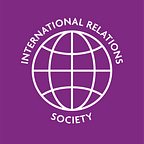2022: Mama Mia, Here We Go Again (Good God is Life Ever Going to be Normal or are We on This Rollercoaster Forever Now)
By Anna Lysenko, 2021–2022 IRSOC Blogger
Happy New Year! For a few brief months in 2021, it seemed like the world was finally returning to normal. The pandemic was winding down, climate change conferences continued, and there didn’t seem to be a threat of World War 3 looming somewhere in the background. However, with new COVID-19 variants emerging as 2021 ended, 2022 arrived with its own near and distant challenges. To be sure, there’s still hope for a bright future, as there usually is. Yet the following challenges are likely to persist, and grow in significance, in the new year:
- The Pandemic. Yes, I know, I know, everyone is tired of this never-ending slog of mask mandates, restrictions, lockdowns, social distancing, etc. but despite the World Health Organization’s surprisingly optimistic prediction that COVID-19 will “end” by the end of the year, the pandemic and its effects will likely continue to shape politics. Still, I wonder if the pandemic could down-size, or at least be managed better, in the coming year. I’m pro-mask and pro-vax, but even I have begun to feel immense pandemic fatigue; hearing about the new variants of COVID made me roll my eyes more than once.
- Dealing with Russia. I’ll be honest: I’m pretty biased regarding Russia. Being Ukrainian, it’s been hard to accept Putin’s persistent interference against Ukraine’s aspirations of being a developed, Western-style democracy and NATO member. However, the world doesn’t seem to be in a rush to accept this either: although Ukraine largely fell out of the news cycle since the Russian invasion of 2014, large Russian troop gatherings on the eastern border of Ukraine have forced the USA and Europe to consider further measures to defend not only Ukraine, but the principles for which the conflict stands for: sovereignty, democracy, and freedom.
- China. Similar to Russia, China is a quasi-authoritarian state with the economic, political, and social potential to shape the current global order. However, with China in particular, the question remains as to whether its more active role in politics ought to be met with additional resistance. China continues to intern Uyghurs and other Muslims in Xinjiang in “re-education” camps that reportedly completely disregard their human rights. Although many countries have condemned China’s actions, others have stopped before pursuing more meaningful actions for fear of missing out on Chinese investment.
- Climate Change. The struggle to get governments to agree to protect the environment for future generations is ongoing, and an uphill battle. Although 2021 saw the COP26 conference set some new targets for countries to stop greenhouse gas emissions by 2030 and 2040, the conference was criticized for setting standards that were unbinding and not nearly urgent enough. Furthermore, questions remain as to whether governments are willing to further restrict the environmental damage caused by private companies. 2022 will likely see the continuation of these struggles and efforts.
- Cyberpolitics. Although the field of cyberpolitics is a relatively new one, it islikely to grow in importance in the coming year and decade. Foreign Affairs has already published its January issue, full of articles that explore and discuss how digital politics shape real-life events; since technology is becoming increasingly intertwined with our everyday lives, it will be interesting to see how it shapes international relations.
2022 will force us to reckon with large, looming global challenges that have no easy solutions. Much like in the previous years, we can only hope that the world will be able to stick together, persevere, and wish for a good year and a bright future.
Cheers to 2022!
